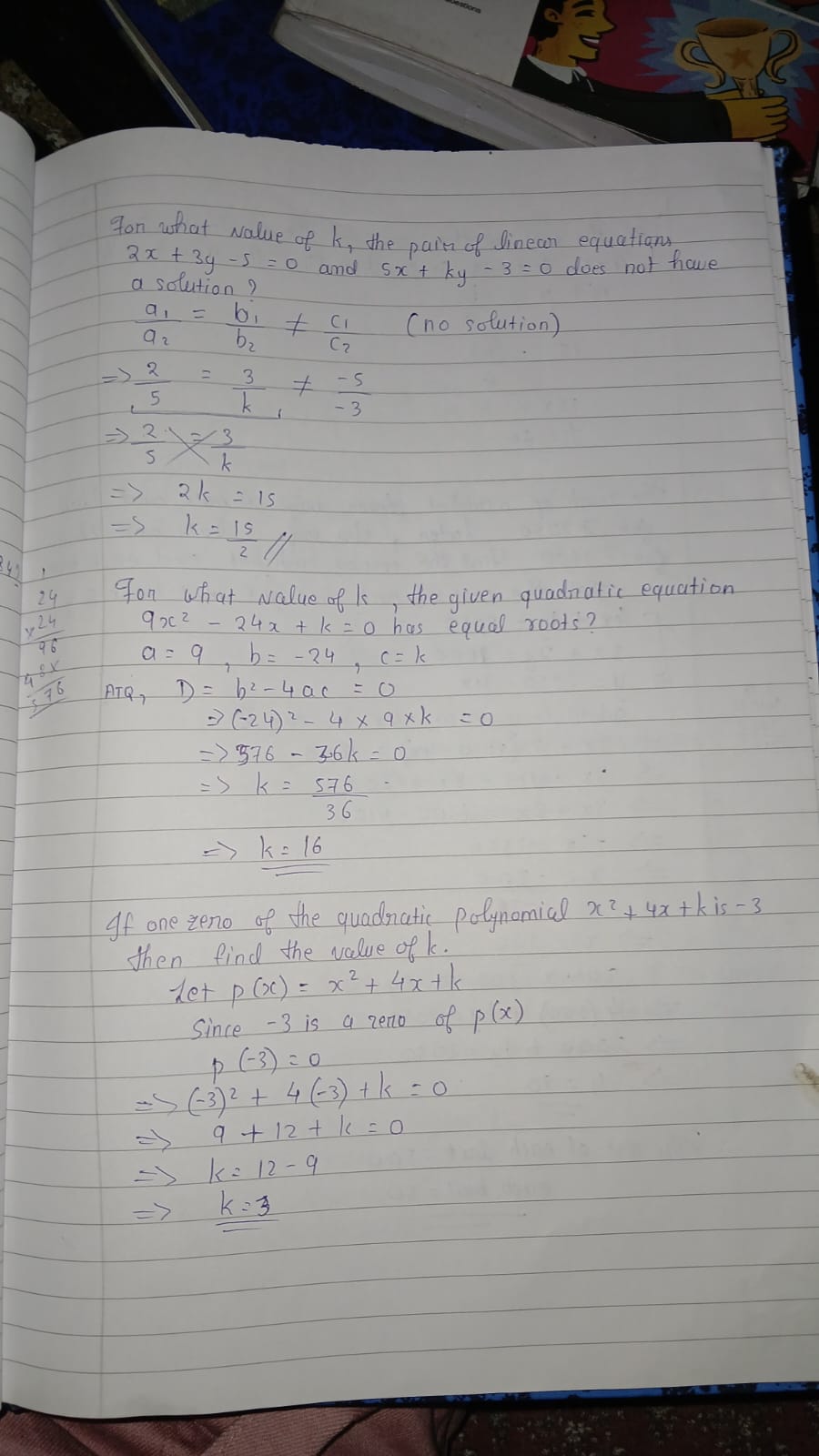For what value of k do the pairs of linear equations 2x + 3y - 5 = 0 and sx + ky - 3 = 0 not have a solution? For what value of k does the quadratic equation 9x^2 - 24x + k = 0 hav... For what value of k do the pairs of linear equations 2x + 3y - 5 = 0 and sx + ky - 3 = 0 not have a solution? For what value of k does the quadratic equation 9x^2 - 24x + k = 0 have equal roots? If one zero of the quadratic polynomial x^2 + 4x + k - 3 is -3, then find the value of k.

Understand the Problem
The question contains three parts: 1) It asks for the value of k for which two linear equations do not have a solution. 2) It asks for the value of k that causes a quadratic equation to have equal roots. 3) It inquires about the value of k when one zero of a quadratic polynomial is given. Each part involves solving equations using algebraic methods.
Answer
1. $k = \frac{15}{2}$ 2. $k = 16$ 3. $k = 3$
Answer for screen readers
- For the linear equations, $k = \frac{15}{2}$.
- For equal roots, $k = 16$.
- For the polynomial, $k = 3$.
Steps to Solve
- Condition for No Solution (Linear Equations)
For two linear equations to have no solution, they must be parallel. The conditions are given by:
$$ \frac{a_1}{a_2} = \frac{b_1}{b_2} \neq \frac{c_1}{c_2} $$
Given:
- Equation 1: $2x + 3y - 5 = 0$
- Equation 2: $5x + ky - 3 = 0$
Identifying coefficients:
- $a_1 = 2$, $b_1 = 3$, $c_1 = -5$
- $a_2 = 5$, $b_2 = k$, $c_2 = -3$
Set up the ratio:
$$ \frac{2}{5} = \frac{3}{k} $$
Cross-multiplying gives:
$$ 2k = 15 $$
Thus:
$$ k = \frac{15}{2} $$
- Condition for Equal Roots (Quadratic Equation)
For a quadratic equation to have equal roots, the discriminant must be zero:
$$ D = b^2 - 4ac = 0 $$
Given:
$$ 9x^2 - 24x + k = 0 $$
Identifying coefficients:
- $a = 9$, $b = -24$, $c = k$
Set up the discriminant:
$$ (-24)^2 - 4(9)(k) = 0 $$
Calculating:
$$ 576 - 36k = 0 $$
Solving for $k$ gives:
$$ 36k = 576 $$
Thus:
$$ k = \frac{576}{36} = 16 $$
- Finding k from One Zero of a Polynomial
Given a polynomial:
$$ p(x) = x^2 + 4x + k $$
And knowing one zero is $-3$:
$$ p(-3) = 0 $$
Substituting:
$$ (-3)^2 + 4(-3) + k = 0 $$
Calculating:
$$ 9 - 12 + k = 0 $$
This simplifies to:
$$ k = 12 - 9 $$
Thus:
$$ k = 3 $$
- For the linear equations, $k = \frac{15}{2}$.
- For equal roots, $k = 16$.
- For the polynomial, $k = 3$.
More Information
These results illustrate how to handle different types of polynomial equations and conditions for solutions, emphasizing the importance of understanding the relationships between coefficients.
Tips
Examples of common mistakes include:
- Forgetting to set the discriminant to zero when finding equal roots.
- Miscalculating ratios when determining conditions for parallel lines.
- Incorrectly substituting values for zeros of polynomials, leading to wrong conclusions.
AI-generated content may contain errors. Please verify critical information